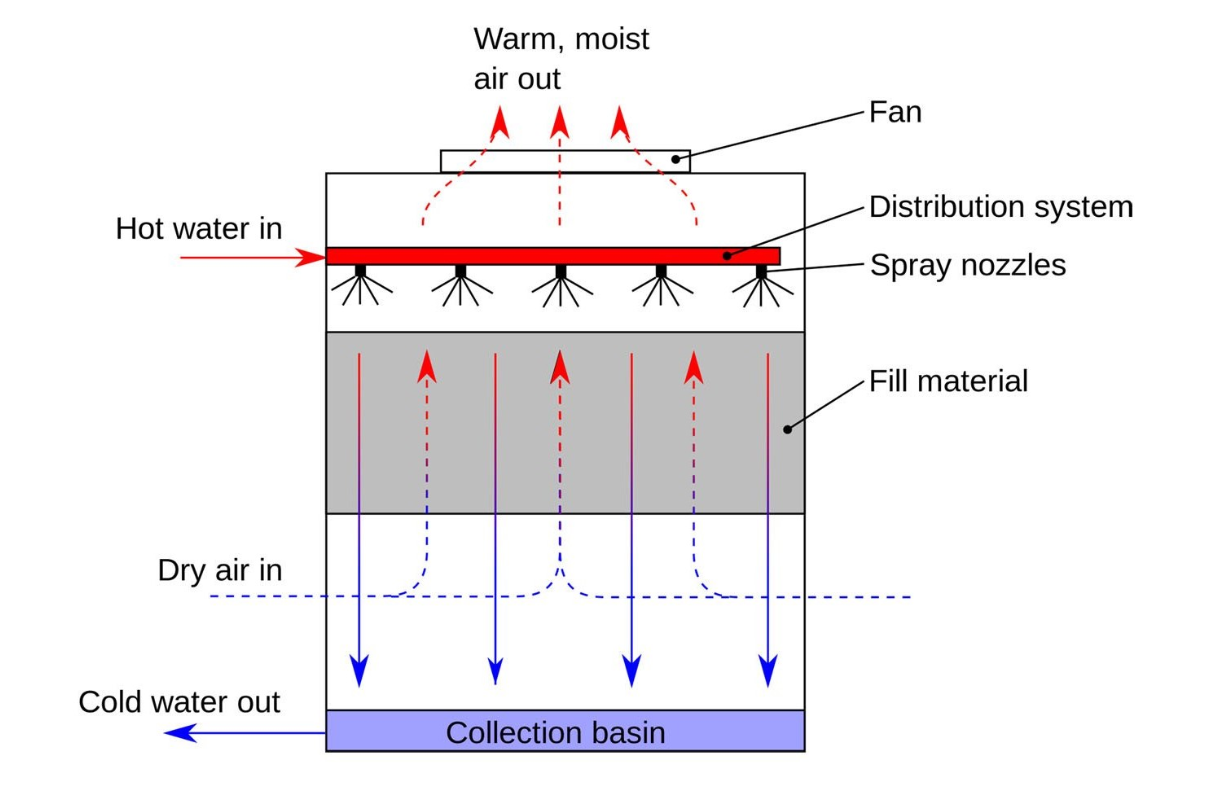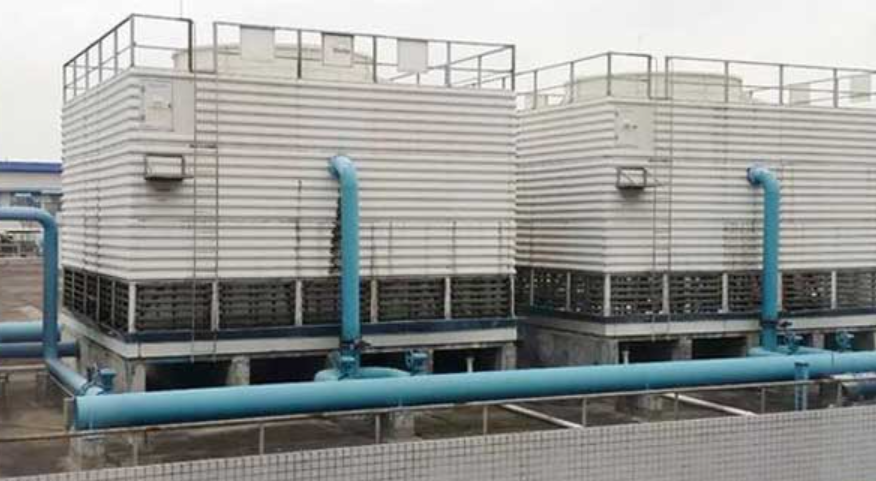
1. How Cooling Towers Work?
Cooling towers operate on the principle of:
Explanation: Cooling towers primarily operate on the principle of evaporation, where water absorbs heat as it evaporates.
2. What is the function of the fill material in a cooling tower?
The fill material in a cooling tower enhances heat transfer by:
Explanation: The fill material in a cooling tower enhances heat transfer by increasing the surface area of water exposed to the air.
3. What role does the fan play in a cooling tower?
The fan in a cooling tower creates:
Explanation: The fan in a cooling tower creates cross-flow or counter-flow, depending on the cooling tower design, by drawing in air from the bottom.
4. What is the purpose of the nozzles in a cooling tower?
The nozzles in a cooling tower:
Explanation: The nozzles in a cooling tower spray water into small droplets, increasing the surface area for efficient evaporation.
5. Which type of cooling tower allows direct contact between water and air?
Open cooling towers permit:
Explanation: Open cooling towers allow direct contact between water and air, enhancing heat transfer but with a higher water consumption rate.
6. What is the benefit of closed cooling towers?
Closed cooling towers use a heat exchanger to:
Explanation: Closed cooling towers use a heat exchanger to transfer heat from water to a separate air stream, resulting in lower water consumption rates.
7. What are the environmental benefits of cooling towers in industrial processes?
Cooling towers in industrial processes can help to:
Explanation: Cooling towers in industrial processes can help to reduce emissions, making them environmentally beneficial.
Don’t miss the following related topics on Cooling Towers
Short Article on How Cooling Towers Work
Cooling towers are essential components of many air conditioning and industrial systems. They play a crucial role in removing heat generated by equipment and processes, ensuring efficient operation and comfortable environments.
Heat Removal through Evaporation
Cooling towers work on the principle of evaporative cooling. Overheated water from air conditioning equipment or industrial processes flows through the tower, where it is recirculated and exposed to cool, dry air. As the water evaporates, it absorbs heat from the remaining water, causing it to cool down.

Key Components and Their Functions
- Fill: The fill material increases the surface area of the water exposed to the air, enhancing heat transfer.
- Nozzles: Nozzles spray the water into small droplets, further increasing surface area and facilitating efficient evaporation.Opens in a new windowspxcooling.comCooling tower nozzles
- Fan: A fan at the top of the tower draws in air from the bottom and moves it upwards, in the opposite direction of the water flow. This creates cross-flow or counter-flow, depending on the cooling tower design.
- Airflow: The airflow helps to carry away the heat absorbed by the water as it evaporates.
The Cooling Cycle: How Cooling Towers Work
- Overheated water enters the cooling tower.
- Nozzles spray the water into small droplets across the fill, increasing surface area.
- The fan draws in cool, dry air from the bottom of the tower.
- As the air flows upwards, it comes into contact with the water droplets.
- Heat is transferred from the water to the air through evaporation.
- The cooled water is collected at the bottom of the tower.
- The cooled water is re-circulated to the air conditioning equipment or process.
- The cycle repeats continuously.
Types of Cooling Towers: How Cooling Towers Work
There are two main types of cooling towers:
- Open cooling towers: These towers allow direct contact between the water and the air. They are simple and inexpensive to build and maintain but can have a higher water consumption rate.
- Closed cooling towers: These towers use a heat exchanger to transfer heat from the water to a separate air stream. They are more efficient and have lower water consumption rates but are more expensive to build and maintain.
Benefits of Cooling Towers
- Efficient heat removal: Cooling towers provide a reliable and efficient way to remove heat from air conditioning and industrial processes.
- Reduced energy consumption: By cooling water efficiently, cooling towers can help to reduce energy consumption.
- Improved comfort: In buildings, cooling towers ensure comfortable air conditioning.
- Environmental benefits: In industrial processes, cooling towers can help to reduce emissions.
Conclusion
Cooling towers are vital components of many modern systems. They play a crucial role in ensuring efficient and sustainable operation of air conditioning and industrial processes, contributing to comfortable environments and environmental protection.
Table of Contents
Don’t miss the Course on Effective Isometrics Management: Check Now
Enrollment Link
Recommended courses (Published on EPCLand)
- Complete Course on Piping Engineering
- Basics of Piping Engineering
- Piping Layout Engineering
- Piping Material Engineering
- Piping Stress Analysis
- Material Requisitions
- Piping Material Specifications
- Valve Material Specifications
- Plant Design & Layouts-OISD 118
- Isometric Management
Library of Technical Articles
Don’t miss out the collection of 15+ articles on following topics:
- Basics of Oil and Gas Industry
- Valves
- Testing
- Tank
- Piping Bulk Items
- Pipe
- Metallurgy
- Piping Materials
- Layout
- Instrumentation
- Heat Exchanger
- Type of Contracts
- Codes and Standards
- ASTM Standards
- Articles on Piping Specialty Items
Video details of Complete Course on Piping Engineering
Why Enroll in the EPCLand
Proven Track Record– PTR
Activities & Achievements before launching EPCLand
- Published more than 50+ short courses
- 3000+ Enrolments
- More than 3,500,00 Minutes of watch hours in the last 2 years
- 4000+ Students in 100+ Countries
- Rating of 4+ out of 5
- 1000+ YouTube Videos
- 8K+ Subscribers
What Students will Learn
- Codes & Standards of the Energy Sector
- Piping Material Engineering
- Piping Layout Engineering
- Stress Analysis
Interesting facts
- All the published courses have been developed by Industry Experts with more than 2 decades of experience
- Content is based on Practical experience and real-time problems.
- Content is designed and organized in such a manner that it can be easily grabbed.
- Complete website, Blogs and Quiz sections are Planned, Designed and published by myself (About me: Atul Singla)
- Complete flexibility of Time & Location, Students can access the content from anywhere & anytime
- Moreover, once enrolled, the content can be access as many times as you want, which helps in understand the fundamentals in a better way.
Conclusion
In conclusion, our courses are meticulously crafted by industry experts with over two decades of hands-on experience. The content is rooted in practical knowledge, addressing real-time problems. The material is thoughtfully designed and organized for easy comprehension. Every aspect, from the website to blogs and quizzes, has been planned, designed, and executed by Atul Singla, ensuring a comprehensive and seamless learning experience. With the flexibility of accessing the content at any time and from any location, students have the freedom to learn on their terms. Furthermore, enrollment grants unlimited access, allowing learners to revisit the material as often as needed, fostering a deep understanding of the fundamentals.



